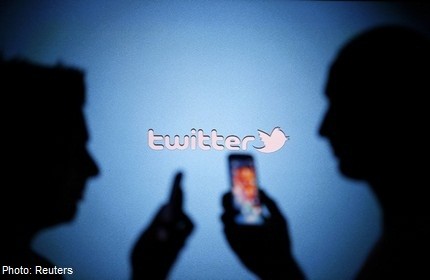Twitter quitters take shine out of IPO


SAN FRANCISCO - Retired schoolteacher Donald Hovasse signed up for Twitter about a year ago at the urging of his daughter.
He lost interest after trying the service a few times and finding lots of celebrities but few of his friends using the social network.
"I didn't really get the point of it at all," said the Las Vegas resident. "Most of them were people I wasn't interested in hearing what they had to say, anyway."
He said, however, that he does check Facebook every day to see what his friends are up to.
Mr Hovasse's experience highlights a risk for investors as Twitter marches towards this year's most anticipated initial public offering in the United States, expected to begin trading on the New York Stock Exchange in the middle of next month.
According to a Reuters/Ipsos poll, 36 per cent of 1,067 people who have joined Twitter say they do not use it, and 7 per cent say they have shut their account.
In comparison, only 7 per cent of 2,449 Facebook members report not using the online social network, and 5 per cent say they have shut their account.
People who have given up on Twitter cite a variety of reasons, from lack of friends on the service to difficulty understanding how to use it.
Twitter's attrition rate highlights a challenge that has dogged the online messaging site over the years: while it has managed to enlist many high-profile and avid users, from the Pope to President Barack Obama, it has yet to go mainstream in the way Facebook has.
Convincing ordinary people to think of Twitter as an indispensable part of their lives is key to the company's ability to attract advertisers and generate a profit.
Twitter reported it had 232 million "active" users - people who access the service at least once a month - at the end of last month, up 6.1 per cent from the end of June. Its quarter-on-quarter growth in number of active users has not exceeded 11 per cent since June last year.
When Facebook was a similar size, its number of active users was increasing by more than 20 per cent every quarter, and it was not until the social network neared the half-a-billion-member mark that its user growth decelerated to 12 per cent.
Twitter prides itself on staying true to its roots: it lets people send 140-character messages and does not pack in extraneous functions. Since its inception, it has resisted overtly manipulating how people use its platform, instead preferring conventions to be formed organically.
According to the Reuters/Ipsos poll, 38 per cent of 2,217 people who do not use Twitter said they did not find it that interesting or useful. Thirteen per cent said they do not understand what to use it for.
But Mr Brian Wieser, an analyst with Pivotal Research Group, said Twitter's current user base is already big enough to be valuable to advertisers. Investors just need to get more comfortable with the idea that Twitter is not for everyone.
"The practical matter is that this is a niche medium," he said. "Its appeal will never be as broad as that of Facebook," he added.